(Scroll down for the video if you prefer that to audio podcast.)
The most common question I get after giving a talk about the multitude of benefits of restoring soil structure and function and increasing diverse green vegetation is: “How do we scale regenerative agriculture?”
Personally I prefer the question: “In this unique place and living system, where is the next intervention point that could change everything?”
This interview with Vijay Kumar shows how he answered that question with great accuracy, twice, in the context of Andhra Pradesh, a state in Southeast India. This is the story of 20 years of indirect work: awakening the Community, Culture and Consciousness necessary to create the fertile social and economic ground for a massive paradigm shift in farming. A shift that is not just theoretical, but that is rapidly transforming an entire region.
I think it is one of the most important stories of our time.
Frequently in our group chat and Twitter feed from the Andhra Pradesh Community Natural Farming initiative, I wake up to photographs and videos of birds nests, bees, blooming flowers among diverse crops, and other signs of life returning to this land.
These are interspersed with people learning together, reports of human health improving, family farm incomes doubling and tripling, and a growing resilience in the face of economic pressures and storms and droughts. (One of many examples: a recent hurricane destroyed the conventional crops but the naturally farmed crops survived upright and alive–it appears that they were stronger due to the integrity of the plant cells and tissues from healthier soils.)
This is the story of a man--Vijay Kumar Thallam–a public servant in the Indian government, who has devoted his life to the elimination of rural poverty. He has done this primarily through seeing the hidden untapped potential within the system as a whole, and setting up conditions to awaken that potential through two “nodal intervention points.”
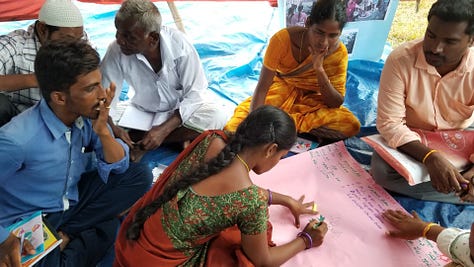
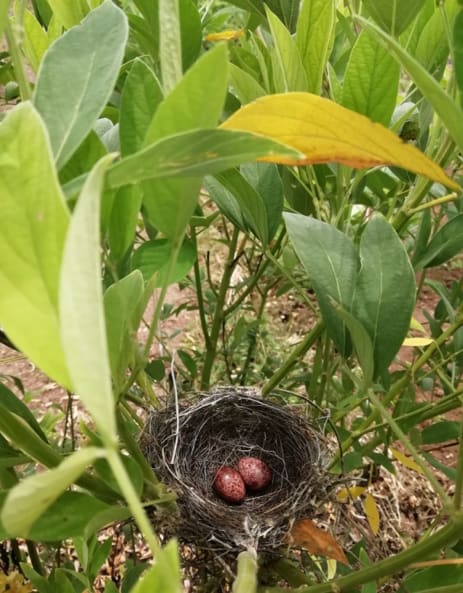
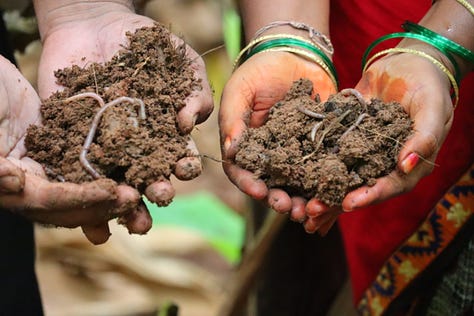
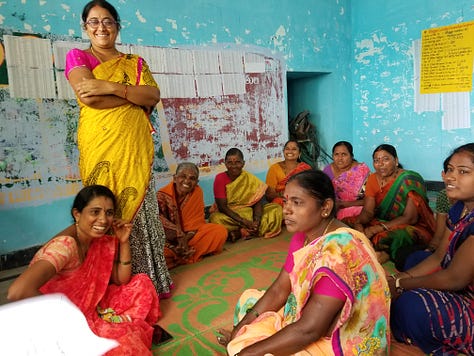
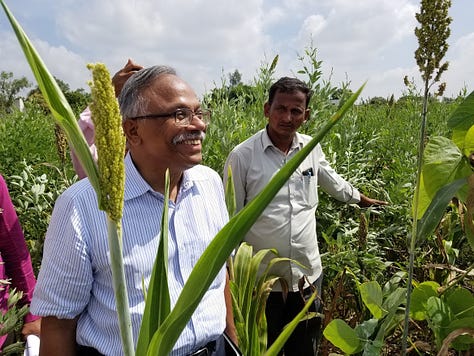
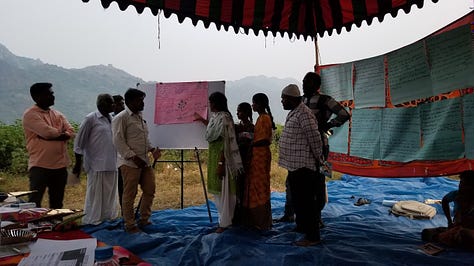
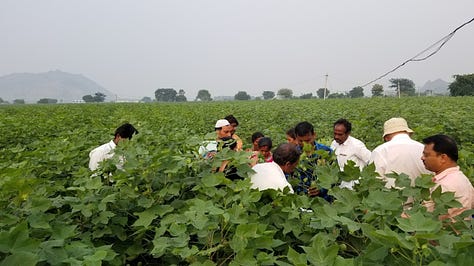
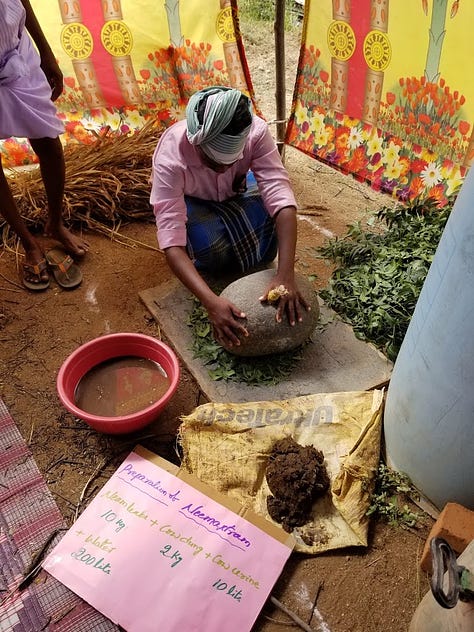
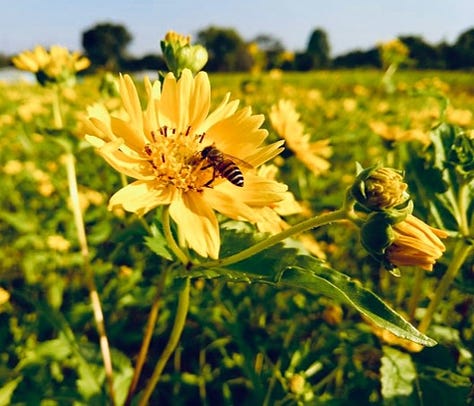
The formation of Women’s Self Help Economic Groups, small groups of poor women coming together for mutual aid in ways that grow enormous social, economic and political strength for the groups them selves, and that are changing many aspects of society. Currently 100 million women in India are participating in these groups.
The proposal of a project to those powerful women (many of whom are farmers): that they might lead a shift away from chemical farming methods and into Community Managed Natural Farming: an agroecological farmer-led approach of continual learning and experimentation.
Since they took this on, they have changed the health and resilience of their families, communities, crops, and ecosystems. It involved a shift away from industrial “Green Revolution” farming methods that were forcing their families into debt; creating dependence on expensive GMO seeds and pesticides and fertilizers; while poisoning human and natural communities; drying up and polluting groundwater; and destroying soil structure and function.
The farmers have been able to dramatically reduce the cost of inputs and increase their net profits on an individual farm basis–bringing more resources into each family and community, while restoring ecosystems and biodiversity. This brief video of one woman's farm shows the dramatic difference between one of these natural farms and the surrounding area. (Imagine if you were a bird flying overhead looking for a safe, cool place to land!)
The Andhra Pradesh Community Managed Natural Farming movement is spreading rapidly throughout the state, currently involving over 800,000 farmers, and also inspiring other states in India and other parts of the world.
This localized “scaling” is quite different from the “scaling of agribusiness” that is bringing enormous profits to large industrial ag companies while leaving farmers in debt, shutting down small farms, and impoverishing communities. However, if you want to call this “scaling of regenerative agriculture” please listen deeply to the actual story (which we will continue with interviews over the next few months).
This is NOT a story of scaling regenerative agriculture into some sort of endlessly replicable franchise, or nailing down an expert-approved list of Best Management Practices. Nor is it a story of incentivizing farmers to make change through financial rewards or promised returns via carbon markets, or forcing new practices through policies and deadlines. There were no payments or incentives offered, no guaranteed prices or markets, no new labels or certifications, no requirements as to how much land anyone needed to try it on, and no timeline by which any individual farmer or village needed to transition.
Rather, this is a story of how they are growing a movement that has engaged and inspired more than 800,000 farmers to try things, experiment, learn together, and keep adapting, innovating, monitoring and sharing with each other what’s working. The power of this movement is precisely because they did not apply a one-size-fits-all approach. It respects the intelligence and self determination of every farmer who participates, and is bringing out the essence of each farm and family, nested within each community and the larger region of Andhra Pradesh, nested within the varied cultures of India.
Though there is much to learn from this initiative, you can’t copy exactly what they did in Andhra Pradesh and expect it to work where you are. You will need to learn to see your place as a whole at work, and find the intervention points that hold potential for change.
The place you live in, the living systems you are nested in, require a unique approach. How can your community create conditions for a paradigm shift to happen? And, rather than it being just a change in opinion—as so much of regenerative agriculture seems to be becoming—how will you create conditions in which farmers in your region can actually act on their new understanding? Can you do that in a way that continually develops new capabilities and understandings? Will you trust that farmers and land managers will choose wisely when conditions actually allow it, rather than “incentivizing” behaviors as if people were not able to think for themselves?
What do your people really care about? What keeps them from being able to create the world they want? What hopes are they giving up on when they escape into addictions and irrational disagreements? What is the indirect work that can help awaken the slumbering potential in Community, Culture, and Consciousness and set things moving again toward more and more life and joy around you?
How might you develop an ongoing practice of learning to see the whole at work—the intelligent work of all of life—and begin to know where and when to step in?
\






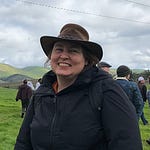



Vijay Kumar: how poor rural women have shifted 800,000 farmers to natural farming in Andhra Pradesh, India.